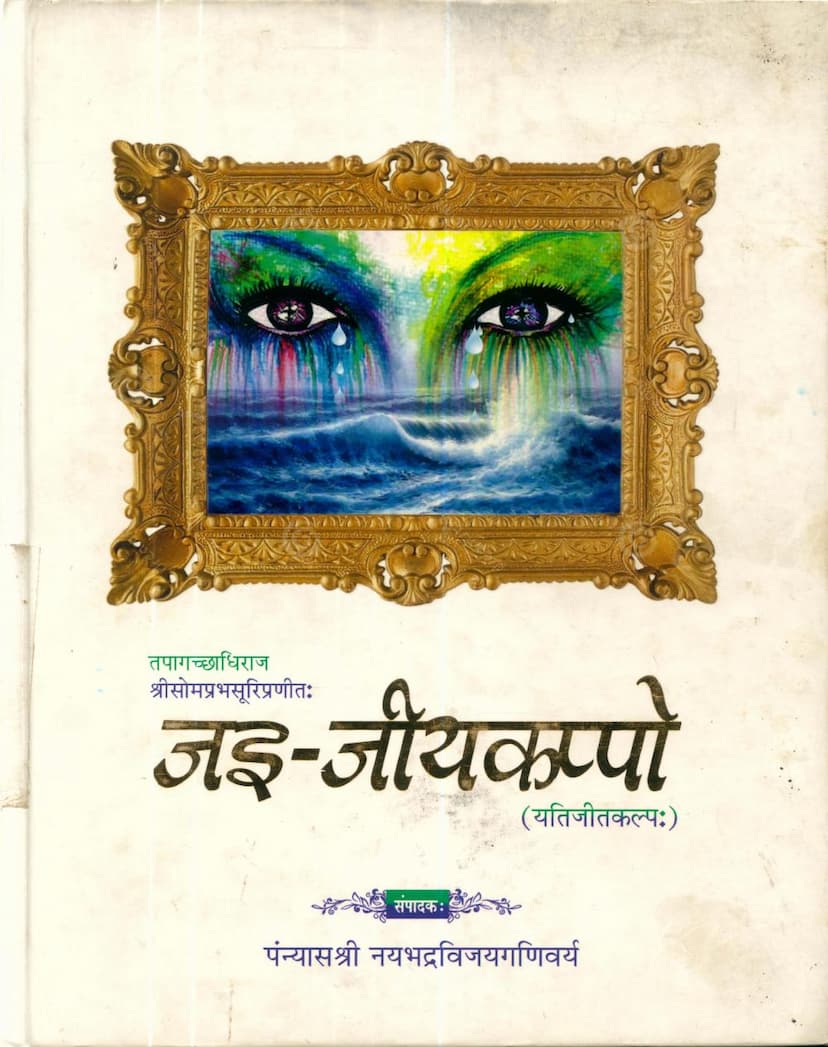Jai Jiyaappo
Added to library: September 1, 2025

Summary
Here is a comprehensive summary of the Jain text "Jai Jiyaappo" (also known as Yati Jita Kalpah) by Naybhadravijay Gani:
Overview of "Jai Jiyaappo" (Yati Jita Kalpah)
"Jai Jiyaappo" (Yati Jita Kalpah), authored by Acharya Shri Somprabh Suri, is a significant Jain text that focuses on the rules of conduct and expiations (prayaschitta) for Jain monks (yati). It is particularly important for its detailed guidelines on how monks should behave and the specific penances they must undertake for any transgressions of their vows and principles. The text is based on the broader foundational texts like Brihat Sth-Vyavahar and Nishith Sutra, but offers a more concise and practical compilation of rules and their associated expiations, making it a crucial guide for monastic discipline.
Key Themes and Content:
The book is structured to provide a comprehensive understanding of Jain monastic life and its associated ethical framework. The core themes include:
-
The Importance of Monastic Life: The text begins by emphasizing the significance of the human birth and the monastic path (sadhu dharma) as the most effective means to achieve liberation from the cycle of birth and death. It highlights the necessity of rigorous study of scriptures (shastra abhyas), adherence to the guru's guidance, and the purification of one's spiritual state (vishuddha parinati).
-
The Role of Cheda Sutras: The introduction places a strong emphasis on the "Cheda Sutras" (Ched Sutras) within the Jain canon. These are considered highly profound and essential texts that deal with the gravest transgressions and their expiations. The text underscores the critical role of these sutras in maintaining the purity of monastic conduct (charitra vishuddhi). It also mentions the strict conditions under which these texts can be studied, emphasizing the need for qualified disciples and the severe consequences (Chatur Guru Prayashchitta) for gurus who impart this knowledge inappropriately.
-
The Nature of "Jita Kalpah": The text identifies "Jita Kalpah" as a significant granth (book) related to the conduct of Sadhus (monks). It is stated to be a concise yet crucial text that serves as a basis for expiations (prayaschitta). The original author is identified as Acharya Shri Somprabh Suri, with a commentary by Acharya Shri Sadhuratna Suri.
-
Detailed Expiations (Prayaschitta): A substantial portion of the book is dedicated to outlining various types of transgressions (atisaras, doshas) and the specific expiations required for them. These are categorized based on:
- Types of offenses: This includes offenses related to different aspects of monastic life such as conduct (achara), knowledge (jnana), faith (darshana), penance (tapas), and overall spiritual discipline.
- Severity of offenses: The text categorizes offenses and their expiations based on their perceived gravity, ranging from minor to major transgressions.
- Specific actions: It details expiations for actions related to eating and drinking (aahar), possessions (upadhi), shelter (vasati), clothing (vastra), the use of utensils (patra), and various types of misconduct.
- Contextual factors: The text considers factors like the intention, the object of the offense, and the circumstances surrounding the transgression when determining the appropriate penance.
- Types of Prayaschitta: It mentions different forms of expiation, including offering apologies (alochana), performing specific penances (tapa), performing rites of purification (utsarg), and in severe cases, facing penalties like the loss of monastic status (parajika).
-
The "Darpika" and "Kalpika" Pratisevana: The text distinguishes between two primary categories of misconduct: "Darpika" (related to pride, arrogance, or carelessness) and "Kalpika" (related to the violation of specific rules or norms). It elaborates on the numerous sub-categories within each, detailing the specific actions that constitute these offenses and their corresponding penances.
-
The Importance of the Guru and Discipline: Throughout the text, there is a recurring emphasis on the role of the guru in guiding disciples. The study of scriptures, the application of penances, and the overall spiritual progress are all dependent on the guru's instruction and grace. Adherence to the established monastic traditions (gachha) and the principles of the lineage (parampara) are also highlighted.
-
Detailed Exposition of Conduct (Achar): The book delves into specific codes of conduct for monks in various situations, including:
- Daily routines: Rules related to daily activities, prayer, and meditation.
- Interactions: Guidelines for interacting with fellow monks, lay followers (shravaks), and even with non-Jains.
- Dealing with circumstances: How to conduct oneself in challenging situations, such as dealing with natural calamities, illness, or social pressures.
- The Five Great Vows (Mahavratas): While not explicitly detailed in the provided excerpts, the underlying principles of these vows (non-violence, truthfulness, non-stealing, celibacy, and non-possession) are the foundation for the specific rules and transgressions discussed.
-
The Structure of the Text: The book is presented with a clear structure, including introductory prayers, dedications, a preface (prastavana), a chapter on the text's introduction (granth parichay), a detailed table of contents (vishayanukram), and a section on abbreviations (sanketaksarsuchi). The detailed table of contents itself provides a roadmap to the extensive discussions on various offenses and their expiations.
Significance:
"Jai Jiyaappo" is a vital resource for understanding the intricate system of monastic discipline in Jainism. It reflects the Jain emphasis on self-purification, ethical conduct, and the path of liberation through rigorous adherence to vows and the diligent application of penances for any lapse. The detailed nature of the text underscores the Jain commitment to maintaining the purity and integrity of the monastic order.
In essence, "Jai Jiyaappo" serves as a practical manual for Jain monks, guiding them through the complexities of their spiritual journey and ensuring the meticulous observance of their sacred vows, thereby contributing to the preservation of Jainism's ethical and spiritual heritage.